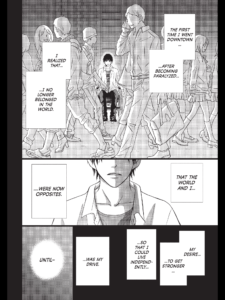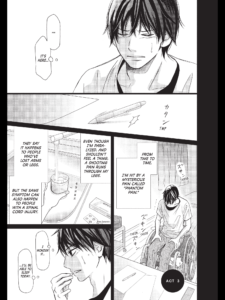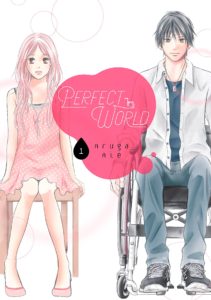Author: Rie Aruga
Available Digitally?: Yes
Genre: Josei (Romance) Manga
Series Complete?: Ongoing
Final Verdict: Buy
Preview?: Read the first chapter here.
My take: A surprisingly heart-wrenching, realistic exploration of romance with a paraplegic.
I’ve been reading a lot of manga lately, because I’ve missed reading so much over the past four years (due to my constant headache), and the advantage of graphic media is there’s less text (and thus less eye strain), yet I can still enjoy stories. I’ve fallen in love with manga in particular because it’s long enough to tell a meaty story and it’s serialized, and I hate having to say good-bye to my favorite characters.
I was pleasantly surprised when I stumbled across Perfect World, a manga about a young woman (Tsugumi Kawana) who runs into her high-school crush (Itsuki Ayukawa) and is surprised to find out they not only work in the same industry (he’s an architect and she’s an interior designer), but that he’s now a paraplegic.
The two become friends and eventually enter into a romantic relationship, despite Ayukawa’s initial reluctance.
 While volume one in particular has a lot of cliches (including the PWD who swears off romance because of what happened to his relationship after he got injured), what surprised me was how realistically Ayukawa’s disability is portrayed. I was particularly impressed that Ayukawa’s character is inspired by a real person (Kazuo Abe), who consults on the manga.
While volume one in particular has a lot of cliches (including the PWD who swears off romance because of what happened to his relationship after he got injured), what surprised me was how realistically Ayukawa’s disability is portrayed. I was particularly impressed that Ayukawa’s character is inspired by a real person (Kazuo Abe), who consults on the manga.
For one, Ayukawa’s wheelchair(s) are illustrated the most accurately of any I’ve ever seen in graphic media before, and Ms. Aruga doesn’t hold back from showing even the most “taboo” reality of spinal cord injury, including hospitalizations, UTIs, pressure sores, etc. While on one hand I was glad to see the author didn’t shy away from these details, on the other it felt like too much all at once, almost as if the reader was being hit over the head with it.
However, I soon learned that the first volume was actually intended originally as a one-shot (meaning it wasn’t going to be serialized), which explained a bit why it felt this way. Fortunately for us, the story was so popular that it was picked up and is now up to volume 8 in Japan with a live-action film planned for this fall. (Only two volumes are available in English as of this writing, with the third releasing June 19.)
 Most of my issues with the first volume faded away as I read the second, as new characters and potential conflicts were introduced. One thing I really like in this series is that disability is portrayed in a positive light overall: Ayukawa is a successful architect, he plays wheelchair basketball, drives, and travels. Yet at the same time Ms. Aruga doesn’t shy away from the problems that come with not only the disability itself (such as neuropathic pain/spasms) but also the complications from being involved with someone with SCI (such as stress and lack of familial acceptance).
Most of my issues with the first volume faded away as I read the second, as new characters and potential conflicts were introduced. One thing I really like in this series is that disability is portrayed in a positive light overall: Ayukawa is a successful architect, he plays wheelchair basketball, drives, and travels. Yet at the same time Ms. Aruga doesn’t shy away from the problems that come with not only the disability itself (such as neuropathic pain/spasms) but also the complications from being involved with someone with SCI (such as stress and lack of familial acceptance).
Overall, I think Ms. Asuga did a fantastic job with her portrayal of SCI, although I still had a few issues. For example, the fact that Ayukawa’s wheelchair is apparently a folding kind rather than a solid-frame, which are lighter and easier to manipulate, especially from a car.
Nevertheless, I found myself empathizing with both main characters, and the ending of volume two really kept me thinking for a long time. It was powerfully evocative, and I really am looking forward to see where the series will go in the future.
If the idea of a manga featuring a realistic portrayal of spinal cord injury sounds right up your alley, then I definitely recommend giving Perfect World a read.











2 Responses to Perfect World, Vol. 1 & 2 Review